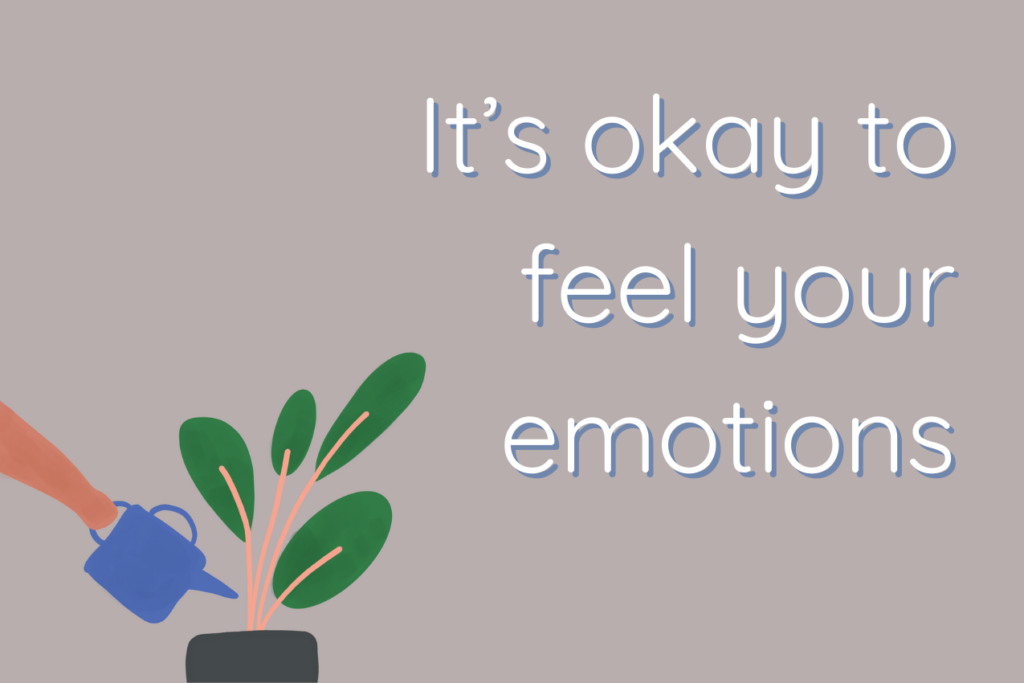It’s okay to feel your emotions
by Raechel Pierce | February 2022
Many times I have experienced people expressing discomfort with feeling their emotions— they resort to finding distractions to quickly avoid confronting them, suppressing their feelings altogether. There is fear that if some emotions are felt, they could have a devastating impact on their functioning, or simply, that there isn’t value seen in acknowledging some emotions because after all,“It won’t fix the issue.” What happens, then, is those emotions never truly go away. They become hidden underneath the surface and build over time, until we can no longer ignore them anymore. Something triggers everything that you have been keeping away, and the emotions come through full force.
We have been taught to view emotions as “good” or “bad”, and to avoid the bad ones altogether; but what if we saw emotions as neither good nor bad? We could then start to see that they have purpose in communicating information to us about ourselves that we otherwise would not have recognized. For instance, anger may be communicating that a boundary is necessary to have in remaining true to ourselves and feeling honored within relationships. With the help of this emotion, we learn what our needs are and to assert them clearly.
Our emotions guide us to understanding what those needs and desires are. That information can help us create a more fulfilling life and develop our sense of self. Emotions are temporary by nature; they come and go like waves of the ocean. It is not until we push our emotions away that they stay longer than intended and become overwhelming.
It’s likely that if you are not used to practicing emotional awareness, you may not know exactly what to do. A good place to start getting in touch with your emotions is to start becoming curious about them and understand what situations or events cause them to come up. Journaling is a great practice to release what is inside and to organize your thoughts. Ask yourself: What is this emotion trying to communicate to me? What might I need to let go of? Do I allow myself to feel this emotion? What am I afraid will happen if I do?
Practice keeping a daily mood log to track when and how often different emotions come up for you. Tracking your feelings throughout the day creates a habit of self reflection, and ultimately self awareness as you will begin to notice patterns and gain a better understanding of naming what you feel. An emotion wheel can help put a name to core emotions you may not have been able to tap into.
Our bodies also serve as indicators of what is going on within us. Pay close attention to your heart, head, and stomach. Notice any bodily sensations such as muscle tension, increased heart rate, upset stomach, etc. When we are in distress, our bodies will tell us before we recognize what we’re feeling. When these sensations come up, ask yourself: What am I feeling at this moment and why?
Exploration into our emotions can be difficult, but spending time getting in touch with them is important to our well being. Having emotions is part of the human experience, and they will continue to come and go, but with practice you will learn more about yourself and feel so much lighter as a result.
While our physical offices are located in South Loop and Lakeview neighborhoods in Chicago, Illinois for in-person sessions, we also welcome and serve clients for online therapy from anywhere in Illinois and Washington, D.C. Clients from the Chicagoland area may choose in-office or online therapy and usually commute from surrounding areas such as River North, West Loop, Gold Coast, Old Town, Lincoln Park, Lake View, Rogers Park, Logan Square, Pilsen, Bridgeport, Little Village, Bronzeville, South Shore, Hyde Park, Back of the Yards, Wicker Park, Bucktown and many more.
At Roamers Therapy, our psychotherapists are here to support you through anxiety, depression, trauma and relationship issues, race-ethnicity issues, LGBTQIA+ issues, ADHD, Autism, or any challenges you encounter. Our psychotherapists are trained in Cognitive Behavioral Therapy, Dialectical Behavioral Therapy, Psychodynamic Therapy, Acceptance, and Commitment Therapy, Person-Centered Therapy, and Gottman Therapy.
Whether you’re seeking guidance on a specific issue or need help navigating difficult emotions, we’re ready to assist you every step of the way.
Contact us today to learn more about our services and schedule a session with our mental health professionals to begin your healing journey. To get started with therapy, visit our booking page.
First, decide if you’ll be paying out-of-pocket or using insurance. If you’re a self-pay client, you can book directly through the “Book Now” page or fill out the “Self-Pay/Out-of-network Inquiry Form.” If you’re using insurance, fill out the “Insurance Verification Form” to receive details about your costs and availability. Please let us know your preferred therapist. If your preferred therapist isn’t available, you can join the waitlist by emailing us. Once your appointment is confirmed, you’ll receive intake documents to complete before your first session.
This page is also part of the Roamers Therapy Glossary; a collection of mental-health related definitions that are written by our therapists.
While our offices are currently located at the South Loop neighborhood of Downtown Chicago, Illinois, we also welcome and serve clients for online therapy from anywhere in Illinois and Washington, D.C. Clients from the Chicagoland area may choose in-office or online therapy and usually commute from surrounding areas such as River North, West Loop, Gold Coast, Old Town, Lincoln Park, Lake View, Rogers Park, Logan Square, Pilsen, Bridgeport, Little Village, Bronzeville, South Shore, Hyde Park, Back of the Yards, Wicker Park, Bucktown and many more. You can visit our contact page to access detailed information on our office location.

